Last Friday, our group of slightly sleep-deprived, but enthusiastic travelers awoke at 7:15 for a typical Nicaraguan breakfast of gallo pinto and scrambled eggs with a glass of mango juice to wash it down. To warm us up for our politics day, Julia surprised us with a quick yoga session, in which many of us realized that we might not be as flexible as we thought when we left for this trip… Our exploration of Nicaraguan politics began with a general overview of the government structure and the current control of the Sandinistas, a socialist government that promotes free education and healthcare. Alex explained to us that the opposition to the Sandinistas consists of a diverse group of separate parties whose views vary from moderate to radical, some who support socialism and others who prefer a democratic institution. Generally, however, those who oppose the Sandinistas believe that the quality of the free education and healthcare is too poor and that those in poverty do not receive enough government aid. We realized during this seminar that, sadly, it seems that many Nicaraguan people have to prioritize their daily survival above involvement in political affairs and therefore many of the rural poor participate little in their government. Many of us were grateful for this insight as we continued to explore how politics affect the typical Nicaraguan citizen.
Feeling a bit more informed about the politics of Nicaragua, we took a break to work on our CAP (Community Action Project) presentation. Separated into our three groups for building, painting, and design, we planned our projects and how to present them to the two representatives from Ceramica Negra, a cooperative of eleven women preserving their culture by making and selling black pottery. The women responded to our ideas with excitement and smiles. Our CAP Project was underway!
Switching back to politics, we received two guest speakers at the hostel, Keneth and Javier, who gave us their perspective of the politics in Nicaragua. These two young men are strongly opposed to the Sandinista government and gave us a refreshing, but extreme opinion of the opposition to the Sandinista President Ortega. Both speakers believe that the current government was communist and the most corrupt in Central America. They also attested to the restriction of freedom of speech and expression, recounting circumstances in which they were attacked or threatened for wearing shirts supporting Sandinista’s opposition. We learned of the ID system that records how each citizen votes and prevents those non-Sandinistas from getting jobs in occupations such as teaching. Stressing their belief that the current government is repressive and unjust, they explained that it is difficult to find support to oppose Ortega because it is dangerous and can have serious repercussions for the individual and their family. Keneth and Javier argued that because of this fear of the government, the only solution was to engage in a war against the government. This hit many of us deeply, as we experienced first-hand the possible unfolding of another civil war in Nicaragua, a country whose history is marked with many painful wars. This willingness to start another civil war sparked endless questions from the group and I was so proud that my fellow Glimpsers were unafraid to critically question our speakers’ solution to their displeasure with the government. Many of us questioned whether a nonviolent, non-cooperation solution was possible, drawing to mind the work of Gandhi in the early 1900s. Unfortunately, their minds remained unchanged, but we all felt thankful to have met these courageous young men and hear their perspective on the current Nicaraguan government and its affect on the Nicaraguan people. Whether we agreed with them or not, we would probably all agree that these men are inspirational because to be willing to die for one’s country takes great will and bravery.
Still full of questions, we sat down to lunch at the hostel with Keneth and Javier and some of us continued to pummel the speakers with questions. With new information and thoughts buzzing in our heads, we began Free Time, splitting up to prepare for our English Tutoring classes later that day and purchase needed materials like paint and wood for the CAP project. At five o’clock we had a scrumptious dinner with… you guessed it… gallo pinto! And made our way to English tutoring at the nearby school.
Chaos and adorable-ness are two ways to describe English tutoring. We’ve all learned a lot through this experience and hope that our Nicaraguan students have too. At 8 we headed back to the hostel for our nightly meeting and self-reflection, in which we contemplated the knowledge we’d gained and the strong opinions of our two guest speakers. There was a great cry from the group to hear the opposite perspective on the Sandinista government, as the former Sandinista civil war soldier was unable to make it. Thankfully, we were given this opportunity later in the trip.
Politics day was an informative, successful day for all. New experiences were had and new insights gained, as they are every day in our little city of Jinotega, Nicaragua. Personally, this day meant a lot to me because we were given the opportunity to hear the voices of the Nicaraguan citizens and their perspective on their government.

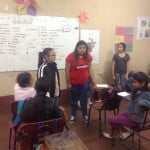
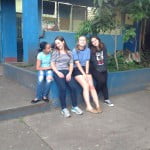
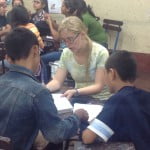
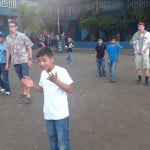
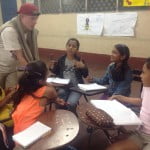
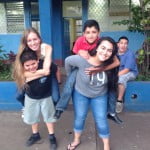
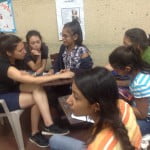
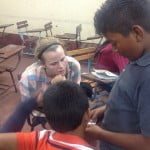
Gaby,
Another very informative blog, and an educational program for us here at home. You did so well in describing what you had learned during the day.
Good for the students who spoke up and asked a lot of questions. It is great that you try to put different ideas in the minds of those with such strong opinions. You may not change their minds, but you certainly gave
them some food for thought. Actually living in their situation day after
day, I can understand why they feel so strongly. I am looking forward to hearing the other side of the story too.
I am so glad for programs like this, that give you a first hand look at situations that are happening in the world. As you move on with your lives, perhaps a few of you will move up into politics and can start to make a
difference in what is happening with this great nation of ours. We certainly do need some fresh new minds on the job :o)
One of the amazing, died-for privilages of being an American is the right to vote. What is also amazing is how few people actually do it. Complain aboutthe government…oh sure. Take the time to be an educated (key word) voter. No sorry. “The Bachelorette” is all I watch on TV.
In other counties, it’s not the same. And many would take being able to decide their fate over watching Andi Dorfman any day.
I hope you come back ready to vote. Because you will be…very soon.
It pains me that our vacation pulled us away from our nightly reading! Especially after learning that you all gather together to read responses! Wow! This was such an informative and thought-provoking blog! I’m happy to hear that Global Glimpse sought out multiple perspectives for the group to listen to and engage thoughtful discussion. It’s good to know that opposing viewpoints were provided, not just the state-mandated government view. How awful to learn that all voting is documented and tracked! How can anyone ever feel brave enough to take a stand?? Another blessing to count as an American. Another question to consider in the quest for human dignity.